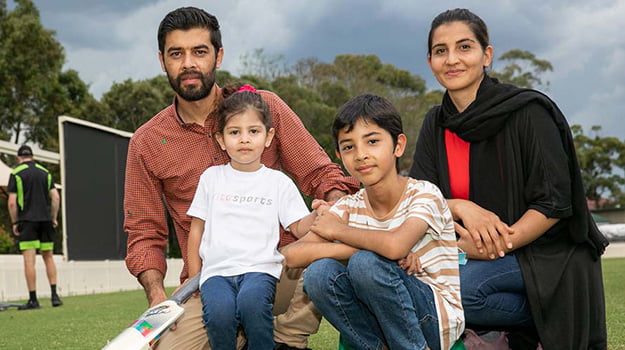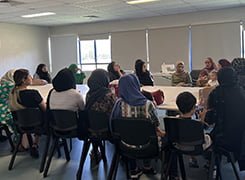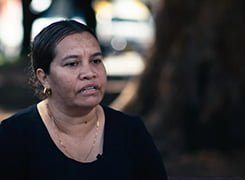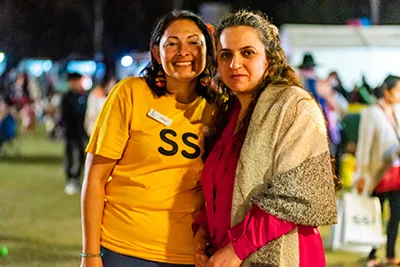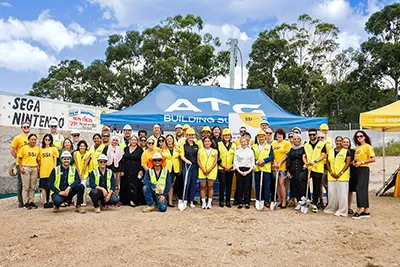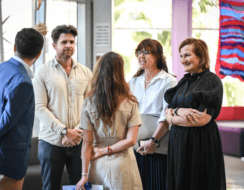23 Jun 2020
NewsIraqi-born researcher and refugee gets work published in prestigious scientific journal
Iraqi-born researcher and refugee Rami Alsaberi with his family at the Penrith Observatory.
Before fleeing the crisis in Iraq in 2013, the Alsaberi family led a comfortable life, other than their youngest family member who has Down Syndrome, all members of the family were well-educated with stable jobs.
After a seventeen-hour drive, the Alsaberi family arrived in their host country where they were supported by, and under the protection of, UNHCR Jordan. When asked about what life in Jordan was like, Mr Alsaberi said it wasn’t easy.
“Not being able to work in Jordan was annoying, but Jordanian people were very friendly and supportive, and UNHCR also supported us.”
After three years in limbo, the Alsaberi family were delivered a message of hope; their humanitarian visa application to Australia was accepted. When asked about how that moment had felt, Mr Alsaberi said that it is difficult to put it into words.
“We rejoiced, but we felt mixed emotions; happiness with fear,” Mr Alsaberi said.
“Happiness for a new beginning and future, fear about what the new country, the community would be like.”
Although, these fears were short-lived, as on arrival they felt instantly welcomed to the country by the Settlement Services International (SSI) team who received them at the Sydney airport.
“SSI helped us with our luggage, took us to our new home in Mount Druitt and, provided us with two years of case management support; we felt very happy in Australia.”
When Mr Alsaberi arrived in Australia equipped with a master degree in astronomy from Baghdad University, it was his mission to continue his dream of leading an academic career and to complete a PhD in Australia.
“I had few dreams before I came to Australia, first to reach Australia, second to work and to do my PhD in astronomy.”
Like most new arrivals, Mr Alsaberi was eager to find himself suitable employment. Yet, despite having substantial work experience back in Baghdad where he had worked at the ministry of science and technology, he wasn’t able to secure himself employment in his field.
Within a year, Mr Alsaberi was accepted into Western Sydney University to undertake his PhD under the supervision of Professor Miroslav Filipovic, who he had met at a sheer stroke of luck after sending an inquiry email to the Penrith observatory. Prof Miroslav Filipovic also happened to be the Chair of the observatory and showed an interest in his background and invited me to meet him the very next day.
“I found observatory at Penrith WSU, and I sent an email to the manager showing him my interest to see and learn about observatory in Australia, I had never saw one in my life,” he said.
“Next day the manager replied and invited me to come.”
After Mr Alsaberi had introduced himself, Prof Miroslav Filipovic showed an interest in Mr Alsaberi’s background and asked him if he’s interested in undertaking a PhD in astronomy, and this took Mr Alsaberi by surprise.
“It was shocking for me as I didn’t expect it,” he said.
“I told him that it was my dream.”
Prof Miroslav Filipovic offered to be his PhD supervisor and guided him through the application process.
“The University of Baghdad prepared an original letter in English to help with my PhD application.”
As a fulltime PhD student of astronomy, Mr Alsaberi’s research is in the field of radioastronomy, and on the subject of supernova remnants.
Today, three years on, the Iraqi refugee is a lead researcher at the facility and recently made an exciting new discovery, which has seen his research published in one of the world’s most prestigious astronomy journals, the Monthly Notices of the Royal Astronomical Society, one of the leading peer-reviewed astronomy journals.
His research has been in the public limelight and was featured across the media. Mr Alsaberi led the discovery of the first moving pulsar in The Small Magellanic Cloud, a dwarf galaxy near the Milky Way, which is visible from Earth.
“This pulsing star is really unique in both the small and large Magellanic Cloud.”
“This is the only pulsar that moves in both galaxies, and our mission now is to find out what is the dynamic behind this movement,” he said.
“It’s an unbelievable feeling, so far I had three dreams that came true – I came to Australia, I started my PhD and I visited some of the best radio telescopes in Australia, I can’t describe my feelings.”
Mr Alsaberi recently wrote about the connection between new arrivals and Australia’s First Nations communities. Click here to read his op-ed.
Learn more about SSI’s Humanitarian Settlement Program here.






